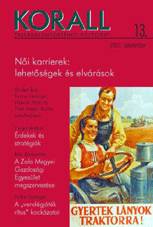A Zala Megyei Gazdasági Egyesület megszervezése a neoabszolutizmus korában
The Organization of the Zala County Economic Association in the Age of Neo-Abolutism
Author(s): Zsuzsanna KissSubject(s): History
Published by: KORALL Társadalomtörténeti Egyesület
Keywords: social history; Hungary; politics; 19th century; association; economic modernisation
Summary/Abstract: By examining the first period of the Zala County Economic Association (1858–1867), this study takes a look at the following statement formulated around the turn of the century: “admittedly, the purpose of early economic associations is to advance agriculture, however their working manifests in political debates.” The founding of the Zala County Economic Association occurred within the first wave of economic association formations (in 1861), with its leadership coming from among members of the county aristocracy and landed gentry, and enjoying the support of the county joint tenants and the economic intelligentsia. This study arrives at the careful questioning of the above quotation by introducing how the association and its membership worked. The examination of the few data available has helped identify the double nature of membership. Accordingly, the core of the association was made up by the old gentry of the county: they not only took the main roles in the public administration and the political life of the county, but also occupied the leading positions within the association. Regular members only received positions next to them, in the administrative leadership of the association. However, reports of the working of the association, moreover both the county and the state economic press testify that the association has neither been the asylum of those banished from politics, nor was it the cave of the political opposition, they rather suggest that its general activity concentrated on the raising of county economy and the successful possible facing with new challenges.
Journal: Korall - Társadalomtörténeti folyóirat
- Issue Year: 2003
- Issue No: 13
- Page Range: 107-124
- Page Count: 18
- Language: Hungarian

